[Editor’s Note: the post below appears today at The Huffington Post.]
By Jason Apuzzo & Govindini Murty. Freedom must thrive for the arts to flourish. It’s therefore an encouraging sign that so many of 2012’s most acclaimed films – such as Zero Dark Thirty, Lincoln, Les Misérables, or Skyfall – should explore the centrality of freedom to our civilization. As we celebrate 2012 in film, it’s fitting that we honor movies that affirm the very liberty that makes our art, our traditions of free speech, and our democratic form of government possible.
Whether depicting historical figures like Abraham Lincoln, or pop-culture icons like James Bond and Katniss Everdeen, or contemporary dissidents like China’s Ai Weiwei and Russia’s Masha Drokova, the movies below illustrate how freedom only survives when brave individuals are willing to risk their lives fighting for it. These films also depict the virtues that accompany such bravery: a strong individual conscience and empathetic feelings of responsibility toward one’s fellow human beings.
Many of this year’s best pro-freedom films also portray the bravery of women. In a refreshing development, movies like Zero Dark Thirty, Barbara, The Hunger Games, and Putin’s Kiss all feature complex, independent women as their leads – while Skyfall, in the character of “M” (Judi Dench), features a strong woman in a pivotal leadership role. This is another way in which these movies powerfully affirm the democratic spirit.
Here then are our ten best pro-freedom films of 2012:
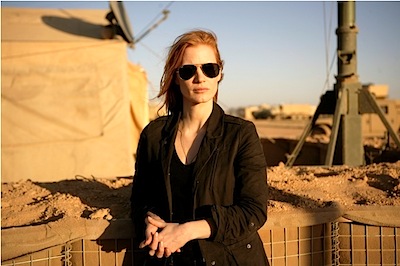
1. Zero Dark Thirty
A taut and intense account of the almost ten year hunt for Osama bin Laden, director Kathryn Bigelow’s Zero Dark Thirty captures the emotional and ethical complexity of the War on Terror – while unfolding a vast, investigative mystery that takes audiences from secret CIA bases in Afghanistan, to the corridors of power in Washington D.C., to the urban mazes of Pakistan. Leading this historic manhunt is an indomitable young CIA analyst named Maya, played with steely resolve by Jessica Chastain, who for nearly a decade tracks down bin Laden’s courier on the way to locating the terrorist mastermind. Scrupulously non-partisan, Zero Dark Thirty gives primary credit for bin Laden’s demise not to any politician – but to sober career intelligence professionals as well as military personnel, a tragic number of whom gave their lives in pursuit of Al Qaeda’s leader. Telling their story with a refreshingly understated realism, Zero Dark Thirty honors these largely anonymous men and women who protect our freedom in an increasingly dangerous and chaotic world.
2. Barbara
Germany’s official Oscar entry and winner of the Silver Bear for Best Director (Christian Petzold) at the 2012 Berlin Film Festival, Barbara is the most compelling depiction since The Lives of Others of day-to-day life in a modern surveillance state – in this case the communist East Germany of the early 1980s. Nina Hoss gives a complex, Oscar-worthy performance as a pediatric surgeon whose desire to leave East Germany puts her under the watchful eye of the Stasi (the secret police), and of a conflicted, would-be lover played by Ronald Zehrfeld. Austere and suspenseful, Barbara is one Germany’s best dramas since the 1970s, and an indictment of any society in which allegiance to a political system overwhelms common humanity.
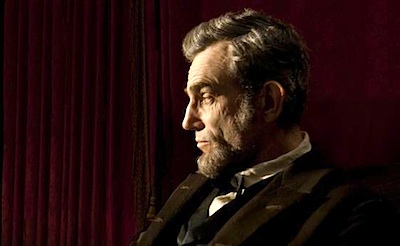
3. Lincoln
Director Steven Spielberg’s Lincoln brings the story of The Great Emancipator to life in a way that is both respectful of our 16th President’s achievements and alive to his humanity. In perhaps the richest depiction of Abraham Lincoln since Henry Fonda’s in John Ford’s Young Mr. Lincoln (1939), Daniel Day-Lewis brings warmth, interiority and conviction to a man charged with the weightiest responsibilities in American history – as both slavery and the fate of the Union hang in the balance. Lincoln also highlights the value of eloquence in free societies; in recounting the sometimes baroque political backstory behind passage of the Thirteenth Amendment, Spielberg suggests that it was Lincoln’s poetic oratory as much as any other factor that ended slavery in America for good.
4. The Other Dream Team
One of the best sports documentaries in recent years, and a highlight of the 2012 Sundance Film Festival, director Marius A. Markevičius’ The Other Dream Team tells the emotional story of the 1992 Lithuanian Olympic basketball team – a symbol of freedom and Lithuanian national pride after decades of Soviet rule. The film tells the improbable tale of how Lithuanian basketball talents like future NBA stars Arvydas Sabonis and Šarūnas Marčiulionis came to dominate Soviet basketball in the 1980s (even defeating Team USA in the 1988 Olympics) – only to face off against Russia in the ’92 Barcelona Games, wearing tie dyed uniforms provided by The Grateful Dead (!), after Lithuania had just won its hard-fought independence. A moving and uplifting piece of Cold War history, The Other Dream Team is as much a tribute to the courage of the Lithuanian people in the face of communist tyranny as it is to the inspirational power of sports.
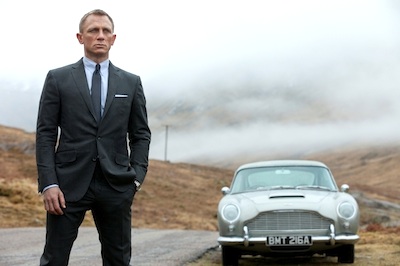
5. Skyfall
One of the best James Bond thrillers since the 1970s, director Sam Mendes’ Skyfall reinvents 007 as a hero for the War on Terror era – and thoughtfully affirms the value of our intelligence agencies in the post-9/11 world. In Skyfall, information pertaining to NATO penetration of worldwide Islamic terror cells has been stolen in Istanbul, and Bond must retrieve the data before Western agents are exposed and killed – the opening act of an elaborate revenge plot orchestrated by the sociopathic Raoul Silva (Javier Bardem). In a film rife with references to Winston Churchill and his legacy, Bond and his colleagues are depicted as reflexively selfless in the cause of freedom – and Dame Judi Dench’s quotation of Tennyson’s poem “Ulysses,” as both she and Britain come under attack, packs an unusually stirring punch for a Bond film.
6. Caesar Must Die
Italy’s official Oscar entry and winner of the Golden Bear for Best Film at the 2012 Berlin Film Festival, Paolo and Vittorio Taviani’s documentary-drama depicts a group of prison inmates – including several with life sentences – rehearsing and performing Shakespeare’s Julius Caesar within their high-security Roman prison. Shot largely in black-and-white, the film features vivid performances from its non-professional cast, who bring a raw passion and fury to Shakespeare’s timeless parable of tyranny and betrayal; plus, uncanny parallels between the prisoners’ lives and Shakespeare’s characters add a poignant, humanistic quality to the drama. Like a pieta-in-motion, Caesar Must Die gives testimony to how art can awaken an inner freedom of the spirit, even in lives broken and brutalized by crime – and it’s a heartfelt evocation of basic human dignity.
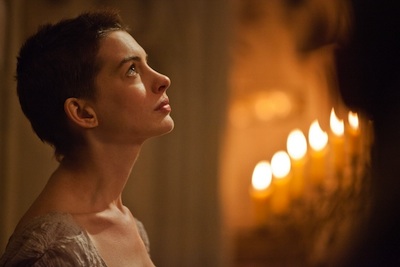
7. Les Misérables
The beloved musical by Alain Boublil and Claude-Michel Schönberg (and by extension, the original novel by Victor Hugo) finally gets the epic treatment it deserves in director Tom Hooper’s heart-on-the-sleeve, verité-style interpretation. The emotional, tortuous journey of escaped convict Jean Valjean toward freedom, respectability, and redemption plays out against the huge canvas of Paris’ June Rebellion of 1832 – an uprising in which a rag-tag band of student freedom-fighters strike a blow on behalf of the poor. Hugh Jackman and Anne Hathaway utterly inhabit their respective roles as the soulful Jean Valjean and the tragic Fantine, and Russell Crowe makes for a formidable Inspector Javert – tormentor of Jean Valjean and pitiless embodiment of the law, devoid of human compassion. Les Misérables plays out like a sentimental, populist ode to liberty – albeit a liberty grounded in social justice and Christian forgiveness – as Jean Valjean earns the freedom he illegitimately gained by sacrificing himself on behalf of others.
8. Ai Weiwei: Never Sorry
Currently on the Oscar short-list for Best Documentary and the recipient of a special jury prize at the 2012 Sundance Film Festival, director Alison Klayman’s Ai Weiwei: Never Sorry depicts the pro-democracy activism of the witty, pugnacious Ai Weiwei, China’s most famous contemporary artist. Outraged by the political repression he sees around him, Never Sorry shows the earthy, voluble artist risking his flourishing career (as one of the designers of ‘The Birds Nest,’ Beijing’s Olympic stadium) to speak out on behalf of democratic reform in China – a risky endeavor that likely has its origins in the persecution of Ai Weiwei’s father during the Cultural Revolution. Using social media tools – mainly Twitter, blogs, and digital cameras – Ai Weiwei becomes a one-man army of free speech and transparency, particularly when exposing the Chinese government’s shoddy “tofu construction” that led to the unnecessary deaths of thousands of school children during the 2008 Sichuan earthquake. For this and other human rights efforts, Ai Weiwei is brutally beaten by the police (suffering a cerebral hemorrhage), imprisoned on trumped up charges, and forbidden from speaking to the media. Unfolding a story that is still in progress, Klayman’s film becomes an indispensable account of how one defiant, creative individual can challenge an authoritarian system and become a symbol of hope around the world.
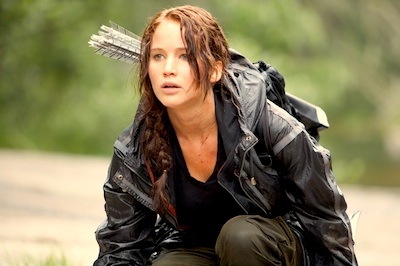
9. The Hunger Games
The spectacular box office success of The Hunger Games affirms that science-fiction remains a vital genre for communicating the value of freedom, in this case to the young women so often marginalized in our popular culture. Directed by Gary Ross, The Hunger Games tells the story of teen heroine Katniss Everdeen (Jennifer Lawrence), who fights for her freedom by way of brutal gladiatorial combat in the future dystopian state of Panem. Drawing on the Greek myth of Theseus, modern reality TV, and imagery of the Vietnam and Iraq wars, Ross and Hunger Games creator Suzanne Collins craft an electrifying depiction of an individual’s fight to free herself from authoritarian state control and media-induced mass conformity. Katniss asserts her integrity and sense of personal responsibility – crucial prerequisites to democratic freedom – by volunteering to take the place of her under-aged sister in Panem’s barbaric ‘Hunger Games.’ Katniss overcomes lethal competitors and manipulation of the Games to become a symbol of hope to an otherwise despairing public, who see in her example that they too can fight for liberty and prevail.
10. Putin’s Kiss
Putin’s Kiss documents the real-life heroism of Masha Drokova, a charismatic leader in the Russian nationalist youth group Nashi who makes the courageous decision to leave the group after she witnesses anti-democratic tactics directed against journalists and human rights activists. As depicted in the film, Masha owes everything to her involvement in Nashi: a coveted job on TV, a nice apartment, a university education, and a medal given to her by Vladimir Putin himself. Yet Masha gives all of this up in protest over the brutal beating of an opposition journalist and friend, Oleg Kashin. At a time when political dissidents face official harassment and jail terms (or worse) for challenging Russia’s leaders, Masha makes waves in activist circles – and puts her future at risk – by standing up for her own personal integrity against pressures emanating from Russia’s authoritarian political class. Directed by Lise Birk Pedersen and winner of the World Cinema Cinematography Award in Documentary at the 2012 Sundance Film Festival, Putin’s Kiss is a timely account of how even those trapped within a corrupt political system can stand up for individual conscience and freedom.

Honorable Mentions: High Tech, Low Life, Stephen Maing’s superb documentary about Chinese dissident bloggers; The Ambassador, Mads Brügger’s darkly comic exposé of corruption in The Central African Republic; Words of Witness, Mai Iskander’s insightful documentary about Egyptian journalist Heba Afify; and The Sheik and I, filmmaker-provocateur Caveh Zahedi’s outrageously subversive mockumentary.
Special Note: we honored Jafar Panahi’s This Is Not a Film and Luc Besson’s The Lady in our list of “The Top Ten Pro-Freedom Films of 2011,” since those films had their initial screenings in 2011 and then went on to wider release in 2012. These fine films are certainly also worthy of your support this year.
We would also like to thank our colleague Joe Bendel for the many excellent reviews he has done of pro-freedom films for Libertas Film Magazine.
Posted on December 31st, 2012 at 8:42am.
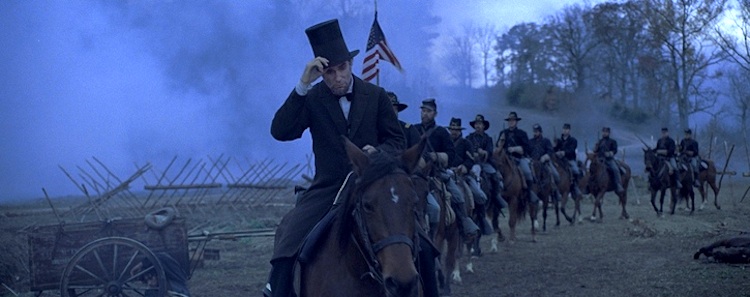
Based on older post of mine:
I had many concerns about Lincoln after knowing that the screenwriter behind “Munich” was involved. and However, upon seeing the film i must admit that i was rather impressed with a number of themes and issues that were tackled in the film (As usual, i speak NOT for the film-makers’ intents, just what i OBSERVED in the FINISHED product).
For example –
1. WAR = There is no “War is not the answer”, “moral equivalence”, or “manipulation by corporation” moment in this film. War IS portrayed as ugly, brutal, and taking its toll on those who live through it. However, LINCOLN also argues that there are times when IT IS NECCESSARY. This is especially in the case of …..
2. FREEDOM = Freedom is not an easy thing to achieve. It takes effort, diligence, and sometimes seems out of reach. The fight for freedom ends up costing on the battlefield, the political world , and even on the personal/family life. That said FREEDOM IS A NOBLE CAUSE WORTH FIGHTING FOR and THOSE WHO FIGHT FOR IT are worthy our respect and Admiration. It is not something you pretend to support in order to make you LOOK GOOD (LYBIA or EGYPT?) or pursue when it is only POLITICALLY CONVENIENT (SILENCE ON IRAN UPRISING?). HOWEVER with freedom comes…….
3. RESPONSIBILITY = A conversation between Lincoln and his wife (as well as other conversations) highlights that while Freedom ensures that people are free to make their own choices and live their own lives; they must also be willling to take RESPONSIBILITY for the choices they make instead of looking for scapegoats. No blaming others for the choices YOU make or setting up OTHERS as FALL GUYS for YOUR FAILURES. (Benghazzi, Fast & Furious, “Blame Bush”anyone?)
4. PATRIOTISM: Lincoln and those who support him realize there are imperfections that exist in America. Nonetheless, THEY LOVE THEIR COUNTRY AND WHAT IT STANDS FOR WITHOUT GUILT (they would not be ashamed to wear a flag pin) OR APOLOGIES!!!!!! NO APOLOGY TOUR in this film. Lincoln and his allies seek to unite, NOT DIVIDE. In addition, the concept of serving during wartimes is shown as difficult not just for those who serve, but their loved ones as well. There is fear, uncertainty, stress, AND HONOR. Serving your country in the name of freedom and justice is HONORABLE AND NOT TO BE LOOKED DOWN ON!! Lincoln himself acknowledges this more than once and makes his respect for the troops known more than once. There is no “baby killer” moment or “dupes of government” moment in this film.
5. BELIEF IN A HIGHER POWER = Many characters reveal their Christian beliefs. Some for right (The anti-slavery folks) and some for wrong (the pro-slavery folks). Yet at NO POINT, are the characters condemned for having Christian beliefs. Even when some of their beliefs are misguided, the fact that the characters are people of faith is always respected. NO CHRISTIAN BASHING OR BITTER CLINGING TO GOD MOMENT IN THIS FILM!!
***The film emphasizes NUMEROUS times that it is the REPUBLICAN PARTY that is fighting for FREEDOM and lessening the grip of government on its citizens while the DEMOCRATS fight for SLAVERY, thus tightening its grip on those individuals. I heard that Mr. Spielberg made comments that the Republicans in the film represented the Democrats of now. However, I cannot recall Obama or many of the far left establishment placing such high stock or even respect when dealing with many of the above discussed themes. (IRAQ War, Protests in Iran, Benghazzi, Fast and Furious, Apology tour, removing of “under god” in pledge of allegiance, All Bush’s fault, etc)
**** In addition(SPOILER!!!!!!!!) Much is made of a REPUBLICAN character carrying on a romantic relationship with an African-American woman and how it is portrayed POSITIVLEY. I find it interesting since it known that the REALLY LIBERAL SPIKE LEE has made his contempt known for interracial relationships, as well as Rob Parker. WONDER WHAT THEY THINK OF THIS FILM.
In the end, i thought the movie was well made and appreciated how it tackled the various themes mentioned above.
I’d also add “Monsieur Lazhar”, a french-Canadian film about an immigrant teacher who gets a job at a Montreal school- he brings traditionalist teaching methods and values to the job, and finds his ability to teach completely stifled by the school’s PC culture.
I’m surprised Act of Valor didn’t make this list. The Avengers scored an A- when it was reviewed here, but that doesn’t merit an honorable mention, at least?